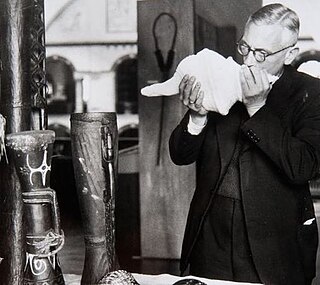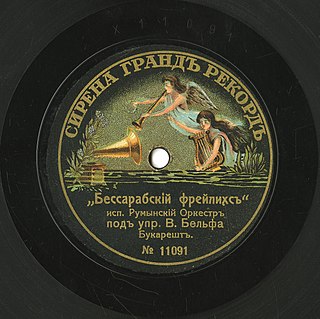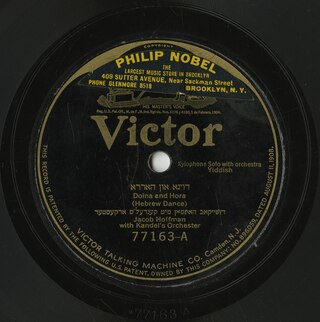Related Research Articles

Ethnomusicology is the multidisciplinary study of music in its cultural context, investigating social, cognitive, biological, comparative, and other dimensions involved other than sound. Ethnomusicologists study music as a reflection of culture and investigate the act of musicking through various immersive, observational, and analytical approaches drawn from other disciplines such as anthropology to understand a culture’s music. This discipline emerged from comparative musicology, initially focusing on non-Western music, but later expanded to embrace the study of any and all different kinds of music of the world.

Klezmer is an instrumental musical tradition of the Ashkenazi Jews of Central and Eastern Europe. The essential elements of the tradition include dance tunes, ritual melodies, and virtuosic improvisations played for listening; these would have been played at weddings and other social functions. The musical genre incorporated elements of many other musical genres including Ottoman music, Baroque music, German and Slavic folk dances, and religious Jewish music. As the music arrived in the United States, it lost some of its traditional ritual elements and adopted elements of American big band and popular music. Among the European-born klezmers who popularized the genre in the United States in the 1910s and 1920s were Dave Tarras and Naftule Brandwein; they were followed by American-born musicians such as Max Epstein, Sid Beckerman and Ray Musiker.

Mantle Hood was an American ethnomusicologist. Among other areas, he specialized in studying gamelan music from Indonesia. Hood pioneered, in the 1950s and 1960s, a new approach to the study of music, and the creation of the first American university program devoted to ethnomusicology, at the University of California, Los Angeles (UCLA). He was known for a suggestion, somewhat novel at the time, that his students learn to play the music they were studying.
Dave Tarras was a Ukrainian-born American klezmer clarinetist and bandleader, who was instrumental in the Klezmer revival.

Joel Rubin is an American clarinetist, klezmer musician, ethnomusicologist, and scholar of Jewish music. Since becoming involved in the klezmer revival in the late 1970s, he has been researching, teaching and performing klezmer music and related genres. He has been a member of, or performed with, such groups as Brave Old World, the Joel Rubin Ensemble, and Veretski Pass.
The Society for Ethnomusicology is, with the International Council for Traditional Music and the British Forum for Ethnomusicology, one of three major international associations for ethnomusicology. Its mission is "to promote the research, study, and performance of music in all historical periods and cultural contexts."
Yale Strom is an American violinist, composer, filmmaker, writer, photographer and playwright. Strom is a pioneer among klezmer revivalists in conducting extensive field research in Central and Eastern Europe and the Balkans among the Jewish and Romani communities since 1981. Initially, his work focused primarily on the use and performance of klezmer music between these two groups. Gradually, his focus increased to examining all aspects of their culture, from post-World War II to the present. He was among the first of the klezmer revivalists to identify the connection between klezmer and lautare and explore that connection in his scholarly and artistic works.

Alicia Svigals is an American violinist and composer. A co-founder of the Grammy-winning band The Klezmatics, she is considered by many to be the world's foremost living klezmer fiddler.
Hankus Netsky is an American multi-instrumentalist, composer, and ethnomusicologist. He chairs the Contemporary Improvisation Department at the New England Conservatory. Netsky is founder and director of the Klezmer Conservatory Band, an internationally renowned Yiddish music ensemble, and serves as research director of the Klezmer Conservatory Foundation, a non-profit organization dedicated to the preservation and perpetuation of traditional Eastern European Jewish music. He plays the piano, accordion, and saxophone.

Michael Alpert is a klezmer musician and Yiddish singer, songwriter, multi-instrumentalist, scholar and educator who has been called a key figure in the klezmer revitalization, beginning in the 1970s. He has performed solo and in a number of ensembles since that time, including Brave Old World, Kapelye, Khevrisa, The Brothers Nazaroff, Voices of Ashkenaz and The An-Sky Ensemble, and has collaborated with clarinetist David Krakauer, hip-hop artist Socalled, singer/songwriter/actor Daniel Kahn, bandurist Julian Kytasty, violinist Itzhak Perlman, ethnomusicologist and musician Walter Zev Feldman, trumpeter/composerFrank London and numerous others.
Shloimke Beckerman also known as Samuel Beckerman, was a klezmer clarinetist and bandleader in New York City in the early twentieth century; he was a contemporary of Dave Tarras and Naftule Brandwein. He was the father of Sid Beckerman, also a klezmer bandleader.

Moisei Beregovsky was a Soviet Jewish folklorist, musicologist and ethnomusicologist from the Ukrainian SSR who was a key figure in the study of Jewish music. He collected, studied and published about klezmer music, Yiddish song, wordless nigun melodies, and the music of Purim plays. His published collections, mostly only released after his death, remain important sources of Jewish music from the late Russian Empire and early Soviet period. Most of his research was done during the period of 1927–1949, during the Stalin era, during which he was faced not only with ideological restrictions, but a period of imprisonment in a forced labour camp from 1950 to 1955. He was rehabilitated after 1955 and continued his work in his final years during the Khrushchev-era.
In music, the Ukrainian Dorian scale is a modified minor scale with raised 4th and 6th, and lowered 7th degrees, often with a variable 4th degree. It has traditionally been common in the music of Eastern Europe, Southeast Europe, and the Mediterranean including Jewish, Greek, Ukrainian, and Romanian music. Because of its widespread use, this scale has been known by a variety of names including Altered Dorian, Hutsul mode and Mi Shebeirach. It is also closely related to the Nikriz pentachord found in Turkish or Arabic maqam systems.

Pedotser, also pronounced Pedutser in some Yiddish dialects, was the popular name of Aron-Moyshe Kholodenko, a nineteenth century Klezmer violin virtuoso, composer and bandeader from Berdychiv, Russian Empire. He was one of a number of virtuosic klezmers of the nineteenth century, alongside Yosef Drucker "Stempenyu", Yehiel Goyzman "Alter Chudnover" and Josef Gusikov.
Avraham-Yehoshua Makonovetsky was a Russian-Jewish Klezmer violinist who acted as a key informant to the Soviet Ethnomusicologist Moisei Beregovsky in the 1930s. His extensive handwritten manuscripts, which are now in the collection of the Vernadsky National Library of Ukraine, serve as a rare example of nineteenth-century Klezmer violin music.

Alter Chudnover, whose real name was Yehiel Goyzman or Hausman, was a nineteenth century Klezmer violinist from the Russian Empire. He was one of a number of virtuosic klezmers of the nineteenth century, alongside Yosef Drucker "Stempenyu", A. M. Kholodenko "Pedotser" and Josef Gusikov. He was also an early teacher to the violinist Mischa Elman.

Stempenyu was the popular name of Iosif Druker, a klezmer violin virtuoso, bandleader and composer from Berdychiv, Russian Empire. He was one of a handful of celebrity nineteenth century Jewish folk violinists from Ukraine; others included Aron-Moyshe Kholodenko "Pedotser" and Yechiel Goyzman "Alter Chudnover" from Chudniv. Sholem Aleichem loosely based his 1888 novel Stempenyu: A Jewish Novel on the real-life Stempenyu; it was adapted into various stage and film versions in the twentieth century.

Belf's Romanian Orchestra was a Jewish music recording ensemble from the Russian Empire. Although little is known about them, their numerous recordings for Syrena Rekord during the period of 1911 to 1914 are among the earliest documented examples of recorded klezmer music and are played in a style very different from the better-known American klezmer recordings of the 1910s and 1920s.

Jacob "Jakie" Hoffman was a Russian-born American Klezmer and orchestral musician, recording artist, and Xylophone player. He played and recorded with Harry Kandel, Philadelphia klezmer bandleaders of the interwar era, and was the father of Klezmer percussionist Elaine Hoffman Watts and grandfather of Trumpet player Susan Watts.
Chaim-Meir Gegner or Gegna was a Russian Jewish violinist, klezmer bandleader and composer from Bila Tserkva. He was one of the celebrity Jewish violinist-composer-bandleaders of 19th century Ukraine, which included such figures as Pedotser, Stempenyu and Alter Chudnover. Several of his sons emigrated to the United States and become professional musicians, including the violinists Naum and Jacob Gegna and the cellist Max Gegna.
References
- ↑ "Mark Slobin". markslobin.com.
- ↑ "Mark Slobin - Faculty, Wesleyan University".
- ↑ Jewish currents - Volume 32 - Page 26 Morning Freiheit Association - 1978 "Editor of Asian Music, the journal of the Society for Asian Music, and vice-president of the Society for Ethnomusicology, he is currently researching immigrant music in the USA."
- ↑ "Biographies of Conference Speakers". Archived from the original on 2017-01-06. Mark Slobin]" [speaker bio] (2003). Conference: "Celebrating Jewish Music at Yale University", April 12-13, 2003. Yale University Library. library.yale.edu. Retrieved 2017-01-05.